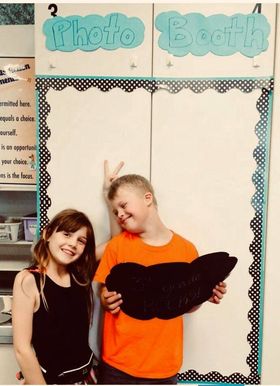Stories of Wil: Who's Counting?
submitted by Christie Taylor
Wil is a 14-year-old boy with Down syndrome. He is the little brother, by 20 months, to twin sisters, Katherine and Elizabeth. Wil’s mom, Christie, knew very little about Down syndrome when Wil was diagnosed shortly after his birth. It didn’t take long for Christie to realize how enriching life with Down syndrome is. Embracing this newfound life, Christie was compelled to share her experiences with Wil. Christie’s desire, in sharing these stories, is to promote an awareness, understanding, and appreciation of the amazing capabilities of individuals with Down syndrome.
Seventh grade was one of Wil’s most challenging years. He entered a new school — the Jr./Sr. High School — with new teachers, new schedules, all while going through puberty. Mix that together with delayed communication skills and it was one heck of a ride!
The only constant were his friends he’s had since elementary school; and the steady calm of his paraprofessional, Kristi Campbell. When Wil went through multiple behavior changes that year, his friends already knew Wil as Wil. Wil is their friend that gives the best hugs, always knows how to make them laugh, will sing and dance anytime or anywhere, and sometimes gets stuck.
Wil would get stuck almost daily in the lunch room. Nearly anything could be the cause for a shut-down in this type of transitionary period between classes. Kristi had to do some serious detective work. Is it too loud in the lunch room? Did something happen in class just before lunch? Was he anticipating his next class? Or did he just want different salad dressing? Kristi’s navigational skills and Wil’s friends were often the only thing that got Wil from Point A to Point B during that time.
Fast-forward two years later and Wil tells Kristi if it’s too loud, why he doesn’t want to go to a classroom, if he’s tired, if he needs a break, and he asks for the salad dressing he wants. It doesn’t mean he doesn’t get stuck anymore, but now it doesn’t last as long.
When Wil came home from his first day of ninth grade, I asked him about his day. He was excited to see Kristi and his friends. He mentioned having lunch with Lila and Ashley but not Sarah.
“And Sarah too, right?” I asked. Wil shook his head. I asked where she was. Wil shrugged his shoulders. (Though Wil now has the words, he’s also very much a teenager that may choose not to use them.)
The next day Sarah’s Mom, Heather, reached out to me. Heather Stommen was Wil’s third grade teacher and he excelled under her tutelage. And she didn’t give him extra special treatment because Wil has an extra chromosome — ask any 46-chromosomed student about Mrs. Stommen and you’ll hear all-star reviews. (Kim Clore was Wil’s paraprofessional in third grade and had been with him since first grade. Knowing Wil as she did, combined with Mrs. Stommen’s teaching skills, made for a strong year of growth. As you can see, consistency is an important factor for Wil).
Heather said that Sarah came home from her first day of ninth grade full of enthusiasm. Sarah told her mom and her dad, Pat, all about her day. Her excited conversation continued throughout dinner. After dinner, the family moved into the kitchen to wash dishes with Sarah still gushing about her day. Then she came to abrupt stop and burst into tears.
Sarah’s reaction brought Heather and Pat to an abrupt stop too. Then Heather saw what triggered this change in emotion. The Pringles can on the kitchen counter.
Back in seventh grade, Wil’s teachers and I sat down to come up with a behavior plan. The idea was to reinforce positive behavior as Wil navigated puberty and a new school. We tried many, many things. Some of which worked not at all; some at best sporadically. I was giving Wil Pringles as a special treat if he rode the bus home. So we tried Pringles. They worked 95% of the time! Not the healthiest choice, but at that point, we were just trying to get Wil through the day.
The Pringles strategy caught on. By eighth grade it became a game amongst Wil’s teachers to find a new flavor of Pringles, and Kristi always had some on hand. Wil’s social studies teacher, Ms. Kastel, would give Wil a Pringles cheer for a job well done.
Sarah was in Ms. Kastel’s class with Wil in eighth grade. Ms. Kastel came up with names for them depending on the lesson — Sarah-toga and Wil-bot stuck.
Sarah had intended to give the Pringles can to Wil the first day of ninth grade. But she discovered they didn’t have any classes together. Not even lunch. Ever since elementary school, even if they weren’t in the same classroom, Sarah would make a point of visiting Wil in his classroom. Sarah was distraught at not seeing her friend. The friend who always made her laugh.
Fortunately, a class switch Sarah had applied for was approved the second day of school. That class switch also required she move to Wil’s lunchtime. Sarah-toga and Wil-bot re-united again!
Every year with Wil, I count on change. Every year with Wil, I count on his growth. Every year I count on the consistency of the friends, families, and educators that don’t count chromosomes (but may count Pringles) — they count on the whole of who Wil is.
“Isn’t that what we all want?” Heather said. And with her words, I count my blessings.









You must be logged in to post a comment Login